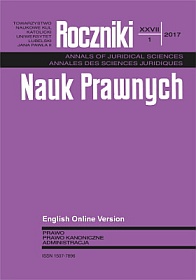A Gloss for the Judgement of the Supreme Court Dated November 23,2012, File Ref. No. IV CSK 598/12
Abstract
The presented gloss discusses the judgement file ref. no. IV CSK 598/12 dated November 23, 2012, issued by the Supreme Court concerning the possibility of recognizing the acquirer of a bankrupt undertaking as its legal successor, and the impact of the amount of contractual payments made to date on the validity of a decision issued in connection with the amount of remuneration for the non-contractual use of the leased thing. The Supreme Court underscores that the disposal of an undertaking of a bankrupt company in the course of bankruptcy proceedings with a winding-up option gives rise to events appropriate for universal succession. The position indicating lack of effect of legal succession on the part of the acquirer concerns the case of acquisition of a bankrupt undertaking which retains its legal existence after bankruptcy proceedings are over. However, this does not apply to the special situation connected with the disposal of an entire undertaking of the company in the course of completed bankruptcy proceedings. The Supreme Court found that in assessing the validity of the contested contractual provision, the extent of the contractual performances made to date in the form of lease payments, cannot play a decisive role. The disproportion in payments cannot be contravene the principles of social intercourse. The presented gloss accepts the arguments of the judgement of the Supreme Court; however, attention is drawn to the principle of proportionality between creditors and a debtor, as well as the import of Article 5 of the Civil Code.
References
Dolecki, Henryk. Postępowanie cywilne. Zarys wykładu. 6th ed. Warsaw: Wolters Kluwer, 2015.
Grzybowski, Stefan. Prawo cywilne. Zarys części ogólnej. 3rd ed. Warsaw: Państwowe Wydawnictwo Naukowe, 1985.
Gurgul, Stanisław. Prawo upadłościowe i naprawcze. Komentarz. 8th ed. Warsaw: Wydawnictwo C.H. Beck, 2011.
Kacprzak, Agnieszka, Jerzy Krzynówek, and Witold Wołodkiewicz. Regulae Iuris. Łacińskie inskrypcje na kolumnach Sądu Najwyższego Rzeczypospolitej Polskiej. 2nd ed. Edited by W. Wołodkiewicz. Warsaw: Wydawnictwo C.H. Beck, 2006.
Kryszkiewicz, Małgorzata. „Przedsiębiorca nie ma co liczyć na taryfę ulgową.” Gazeta Prawna 46 (2014). Accessed March 7, 2014. http://prawo.gazetaprawna.pl/artykuly/782496,przedsiebiorca-nie-ma-co-liczyc-na-taryfe-ulgowa-przed-sadem.html.
Piasecki, Kazimierz. „Komentarz do art. 5.” In Kodeks cywilny z komentarzem. Edited by J. Winiarz. Warsaw: Wydawnictwo Prawnicze, 1980, 18–22.
Radwański, Zbigniew. Prawo cywilne – część ogólna. 10th ed. Warsaw: Wydawnictwo C.H. Beck, 2009.
Romanowski, Michał. „Zobowiązania rezultatu i starannego działania,” Przegląd Prawa Handlowego 2 (1997): 23–26.
Ziembiński, Zygmunt. Logika praktyczna, 16th ed. Warsaw: Wydawnictwo Naukowe PWN, 1993.
Ziemianin, Bronisław, and Katarzyna A. Dadańska. Prawo rzeczowe. 3rd ed. Warsaw: Wolters Kluwer Polska, 2012.
Ziemianin, Bronisław, and Zbigniew Kuniewicz. Prawo cywilne. Część ogólna. Poznań: „Ars boni et aequi” Przedsiębiorstwo Wydawnicze – Michał Rozwadowski, 2007.
Zimmerman, Piotr. Prawo upadłościowe i naprawcze. Komentarz. 2nd ed. Warsaw: Wydawnictwo C.H. Beck, 2012.
Copyright (c) 2017 Roczniki Nauk Prawnych

This work is licensed under a Creative Commons Attribution-NonCommercial-NoDerivatives 4.0 International License.


